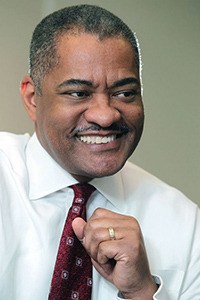Dr. Elson Floyd leaves big shoes to fill at Washington State University.
He was just 59 when he died of colon cancer on June 20. From the day he stepped onto the WSU campus in 2007 he was determined to make big changes, and he did just that. In his short eight years as WSU president, he pushed higher education along faster than universities are accustomed to moving.
He began by taking a page from former Gov. Gary Locke’s playbook.
In 2003, Gov. Locke (D) turned the state’s budget process upside down by establishing the “priorities of government.” Rather than cutting programs equally across the board, Locke and Republican lawmakers prioritized funding to the most vital programs. Locke learned that setting priorities is not easy, and it angers people whose programs are cut.
Floyd learned a similar lesson soon after becoming president of Washington State University.
After the Great Recession struck in 2008, state funding for higher education was eroding. No matter how hard the state’s university presidents lobbied the state legislature, the money simply was not there to fund all the programs the universities offered. Just as Gov. Locke had earlier identified spending priorities, Floyd believed universities needed to prioritize and focus on their core mission.
Floyd took on that daunting task, which meant eliminating some programs. It was not the easy path, but it made WSU stronger. It worked largely because of Floyd’s charisma and determination.
As part of the state’s austerity program to deal with the recession, university presidents were asked to voluntarily take salary cuts. It was an unprecedented move, and not all university presidents complied, but Floyd was the first to do so, cutting his income by $100,000.
Those two early Floyd initiatives set the tone and pace for Washington State University and the state’s higher education system.
Floyd was not afraid of a fight, and none was more challenging than the new medical school in Spokane. The University of Washington felt that, since it already had the state’s only medical school, it was destined to run the new Spokane campus.
He took on the UW leadership and won with guts, determination and hard work. With his passing, there is a well-deserved move to name WSU’s medical school after Dr. Elson Floyd.
“Floyd always made much of WSU’s role as a land-grant university — not an elite institution, but a university for common people and common problems — with programs in agriculture, engineering and veterinary science,” the Seattle Times editorialized.
“This was the people’s university — he liked that,” said John Gardner, WSU vice president for advancement and CEO of the Washington State University Foundation. “He never wore it on his sleeve, but giving voice to those that have no voice — that was part and parcel of who he was.”
Floyd, whose family roots are in the south, became a Cougar and turned down several offers, including the top job at his alma mater, the University of North Carolina at Chapel Hill.
Floyd loved students and if he knew of a student who was ill or having a hard time, he would step in to help — not with the cameras rolling for a news clip — but as a genuinely caring leader and friend.
Mike Bernard, a WSU grad, small business owner and lifelong Cougar who rose to become Association of Washington Business Board chair, worked with Floyd on many WSU projects.
“Elson Floyd just loved his job and loved the students,” Bernard recalled. “He was a deep-hearted guy with a disarming smile.”
Being WSU president was not just a job to Elson Floyd, it was a way of life. That’s a tough act to follow.
Don C. Brunell is a business analyst, writer and columnist. He recently retired as president of the Association of Washington Business, the state’s oldest and largest business organization, and now lives in Vancouver. He can be contacted at theBrunells@msn.com.


